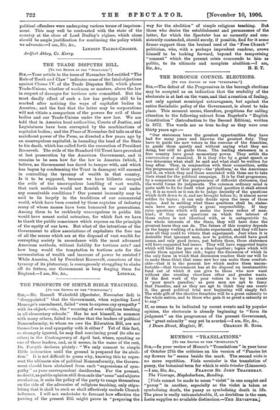THE PROSPECTS OF SIMPLE BIBLE TEACHING.
[TO THE EDITOR OF THE " SPECTATOR:1
Sin,—Mr. Russell Wakefield (Spectator, November 3rd) is " disappointed " that the Government, when rejecting Lord Heneage's amendment, failed "even to express any sympathy" with its object,—viz., the "securing of some religious teaching in all elementary schools." Has he not himself, in common with many others, failed to realise that the leaders of political Nonconformity, to whom we owe the Education Bill, are not themselves in real sympathy with it either? Yet of this fact, so strangely ignored, he may find convincing proof (to cite no other) in the Contemporary of April last, where, speaking as one of those leaders, and, as it seems, in the name of the rest, Dr. Forsyth declares plainly: "We only consent to simple Bible instruction until the ground is prepared for its aboli- tion." It is not difficult to guess why, knowing this to repre- sent the ultimate aim of political Nonconformity, the Govern- ment should have abstained from such "expressions of sym- pathy" as your correspondent desiderates. For the present, no doubt, as public opinion still demands the "some" and abjures secularism, it suits the policy of the party to range themselves on the side of the advocates of religious teaching, only stipu- lating that it shall be such as shall effectively exclude Church influence. I will not undertake to forecast how effective the passing of the present Bill might prove in "preparing the
way for the abolition" of simple religious teaching. But those who desire the establishment and permanence of the latter, for which the Spectator has so earnestly and con- sistently contended, should surely, if possible, find for it some firmer support than the bruised reed of the "Free Church" politician, who, with a perhaps imprudent candour, avows himself to be looking forward, beyond the temporising "consent" which the present crisis commends to him as politic, to its ultimate and complete abolition.—I am,














































 Previous page
Previous page